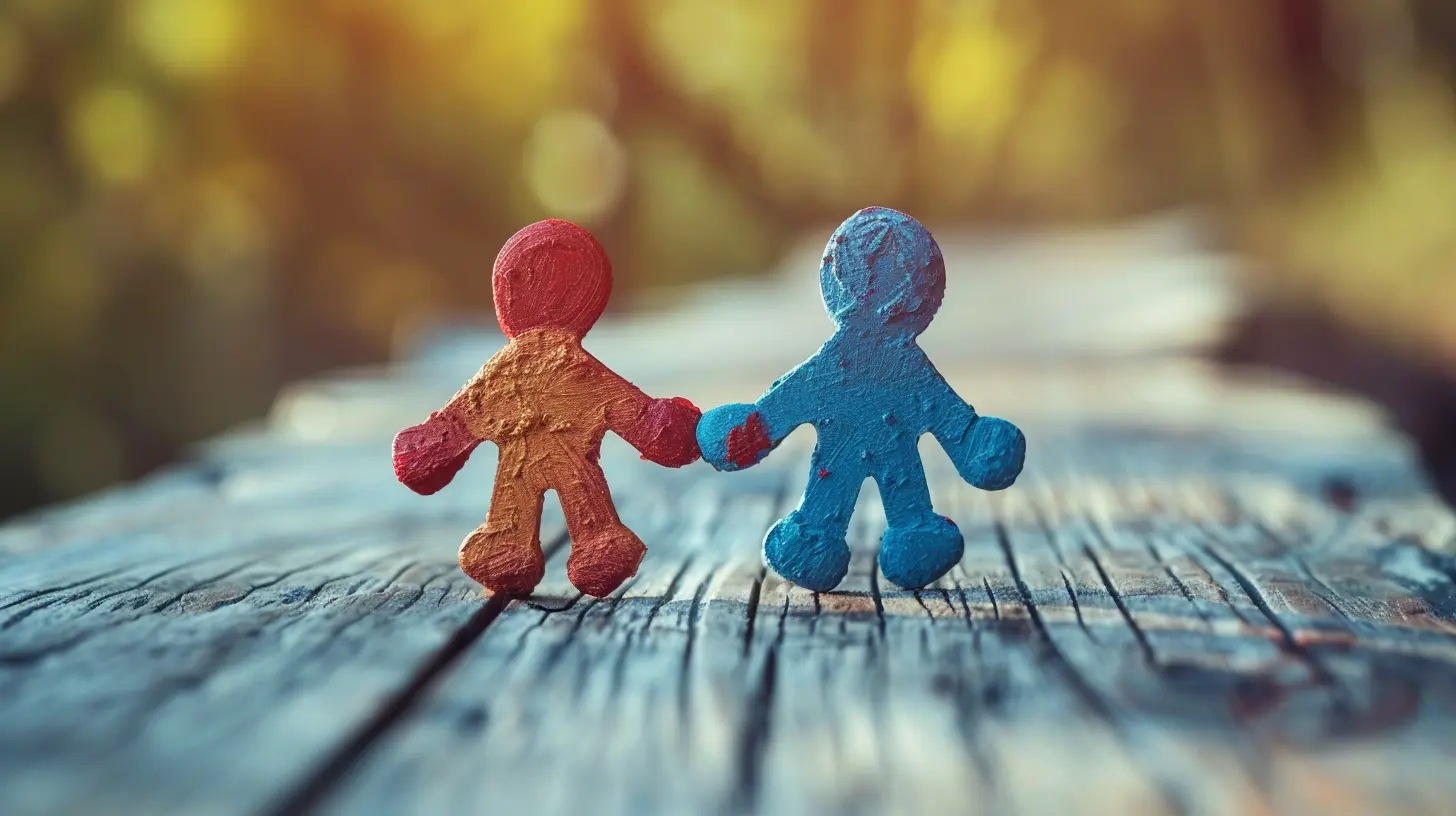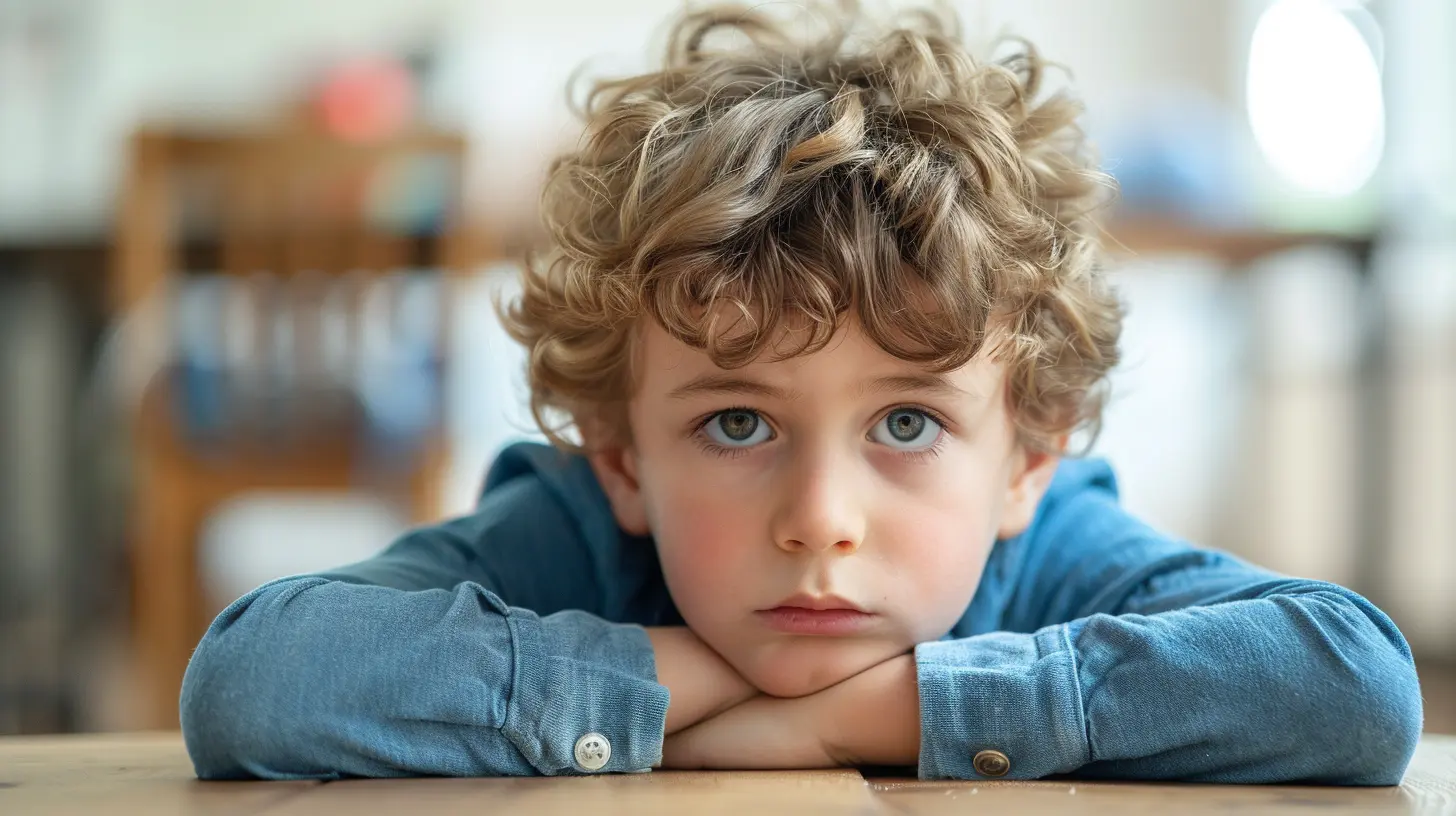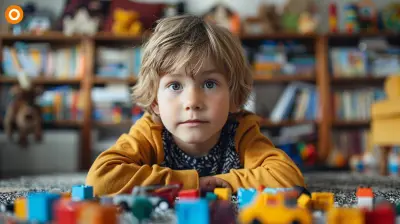How Emotional Regulation Ties into Developing Empathy
25 December 2024
Parenting is no cakewalk, right? Let's be honest—our kids aren’t born with an instruction manual. Between tantrums, meltdowns, and those mysterious quiet moments where you know they’re up to something, there’s a lot to navigate. Yet, one thing that often flies under the radar in parenting discussions is emotional regulation. Trust me, it’s a total game-changer.
Now, why am I harping about emotional regulation? Well, because mastering it is like unlocking a hidden superpower: empathy. That’s right—by helping our kids learn how to handle their emotions, we’re also teaching them how to step into someone else’s shoes. Sounds pretty amazing, doesn’t it? Let’s dive in and take a closer look at how emotional regulation is deeply connected to developing empathy, and why it should top your parenting priority list. 
What Is Emotional Regulation?
Before we jump ahead, let’s break it down. Emotional regulation is just a fancy way of saying “managing your feelings.” It’s the ability to recognize emotions, understand them, and respond in a way that’s appropriate for the situation. Think of it like a thermostat for feelings—you’re neither overreacting with a full-blown meltdown nor shutting down entirely.For kids, though? Emotional regulation can feel more like a rollercoaster than a thermostat. Ever seen a toddler lose it because their teddy bear didn’t "look happy"? Yep, that’s their unregulated emotions taking the wheel. Learning to handle these feelings takes time, patience, and practice.
Why Does Emotional Regulation Matter?
Here’s the thing: unchecked emotions can wreak havoc. They can make kids lash out, spiral into frustration, or withdraw entirely. But when children learn emotional regulation, it’s like giving them the tools to navigate life’s inevitable ups and downs.Think of it like teaching them how to swim. If they’re tossed into the emotional deep end without any skills, they’ll flail. But with guidance, they’ll gradually learn how to stay afloat and eventually swim confidently. And here's the kicker—emotional regulation isn’t just about keeping tantrums at bay. It’s the foundation for empathy. 
What Is Empathy?
We hear the word "empathy" tossed around a lot these days, but what exactly does it mean? At its core, empathy is the ability to feel what someone else is feeling. It’s that little voice inside that says, “I get it. I know what you’re going through.”Empathy is what helps us connect with others on a deeper level. It’s what makes your child comfort a crying friend on the playground or stand up for someone being teased at school. Without empathy, the world becomes a colder, harsher place.
The thing is, empathy doesn’t just pop up out of nowhere. It’s not like one day your child wakes up and says, “Hey, I think I’ll start being more empathetic today.” Nope—it’s a skill, and like any skill, it has to be nurtured. That’s where emotional regulation comes in. 
How Emotional Regulation Builds Empathy
Okay, so how does managing emotions pave the way for empathy? Let’s break it down:1. Self-Awareness Sparks Other-Awareness
When kids learn to identify their own emotions, they become more aware of the feelings of others. It’s like learning to read—once you understand the basics for yourself, you can start interpreting the signs in other people.Picture this: Your child learns to recognize that they’re feeling frustrated because their sibling broke their LEGO tower. Over time, this self-awareness extends outward. When they see their friend upset about losing a game, they’re better equipped to understand what that friend might be feeling.
2. Managing Emotions Prevents Reactive Outbursts
Let’s be real—emotional outbursts don’t leave much room for empathy. If your child is spiraling into a full-on meltdown, it’s hard for them to notice or care about someone else’s feelings in that moment.But, when they develop the skills to regulate their emotions, it’s like hitting pause on the chaos. Instead of immediately getting defensive or angry, they have the bandwidth to think, “Wait—what’s really going on here?” This pause creates space for empathy to kick in.
3. Emotional Regulation Encourages Perspective-Taking
Here’s a fun fact: empathy isn’t just about feeling others’ emotions. It’s also about understanding their point of view. When kids learn to calm down and reflect on their own feelings, they’re better able to step back and consider someone else’s perspective.For example, imagine your child gets upset because their friend didn’t want to share a toy. Instead of throwing a fit, an emotionally regulated child might think, “Maybe my friend really loves that toy and isn’t ready to share it right now.” This kind of perspective-taking is the backbone of empathy. 
The Role of Parents in Teaching Emotional Regulation
So, how can you help your child develop emotional regulation and, ultimately, empathy? Here are some practical tips:1. Be a Role Model
Kids are like little emotional sponges. If they see you yelling at the driver who cut you off or losing it over spilled coffee, guess what? They’ll think that’s how emotions should be handled. Show them how you manage your own feelings calmly and constructively.2. Name the Emotions
Sometimes, kids just need help identifying what they’re feeling. Use words like “I see you feel frustrated” or “It looks like you’re feeling sad.” This helps them build an emotional vocabulary, which is the first step toward regulation.3. Teach Coping Strategies
Deep breaths, counting to ten, or even squeezing a stress ball—give your child a toolkit of ways to manage their emotions when things get tough.4. Encourage Empathy in Daily Life
Talk about feelings often. Ask questions like, “How do you think your friend felt when you said that?” or “Why do you think your teacher looked upset today?” These conversations help your child practice putting themselves in someone else’s shoes.The Long-Term Benefits of Emotional Regulation and Empathy
Here’s the magic of tying emotional regulation to empathy—it doesn’t just create kinder kids; it creates compassionate adults. Children who learn these skills early on are more likely to:- Build healthier relationships.
- Resolve conflicts peacefully.
- Develop resilience and adaptability.
- Be more inclusive and understanding of others.
And let’s face it, the world could always use a little more kindness and understanding, couldn’t it?
Final Thoughts
Teaching emotional regulation isn’t always easy. It’s messy, sometimes frustrating, and often requires endless patience. But the payoff? It’s worth every single ounce of effort. By helping your child learn to manage their emotions, you’re giving them a lifelong gift—the ability to truly connect with others.In the grand scheme of things, isn’t that what parenting is about? Raising kids who are kind, empathetic, and ready to take on the world with open hearts? So, the next time your little one has a meltdown, remember: It’s not just a tantrum. It’s an opportunity to teach them how to regulate their emotions and nurture their budding superpower of empathy.
all images in this post were generated using AI tools
Category:
Teaching EmpathyAuthor:

Tara Henson
Discussion
rate this article
14 comments
Zevonis McGarvey
Great insights! Emotional regulation is essential for fostering empathy in children. Thank you for sharing!
April 7, 2025 at 3:56 AM

Tara Henson
Thank you for your kind words! I'm glad you found the insights valuable.
Parker Scott
Emotional regulation and empathy go together like peanut butter and jelly—messy at first, but once you get the hang of it, the sandwiches of life are way tastier!
March 24, 2025 at 3:23 AM

Tara Henson
Thank you! I love that analogy—emotional regulation truly enhances our ability to empathize, making our interactions richer and more fulfilling.
Porter Huffman
Emotional regulation fosters genuine empathy.
February 11, 2025 at 3:38 AM

Tara Henson
Thank you for your insight! Emotional regulation indeed plays a crucial role in enabling us to connect with others and understand their feelings more deeply.
Vera Reyes
Empathy grows through emotional awareness.
February 1, 2025 at 4:41 PM

Tara Henson
Absolutely! Emotional awareness is the foundation for empathy; understanding our own emotions enhances our ability to connect with and understand others.
Colton Heath
Emotional regulation is the key not only to understanding our feelings but also to unlocking the empathy toolbox. When we manage our emotions, we pave the way for our kids to connect and care. It starts with us!
January 29, 2025 at 5:40 PM

Tara Henson
Absolutely! Emotional regulation is essential for fostering empathy in ourselves and our children. By managing our emotions, we create a supportive environment for deeper connections and understanding. Thank you for highlighting this crucial link!
Aelith McFarland
Great insights! Helping our children master emotional regulation is essential in nurturing their empathy. It’s a vital skill for their growth and relationships.
January 24, 2025 at 4:17 PM

Tara Henson
Thank you! I completely agree—emotional regulation is indeed foundational for fostering empathy and strengthening relationships in our children.
Daniella White
Unlocking the secrets of emotional regulation could hold the key to fostering true empathy in our children. What hidden layers lie beneath their feelings and connections?
January 18, 2025 at 3:31 AM

Tara Henson
Absolutely! Understanding emotional regulation helps children navigate their feelings, leading to deeper connections and enhanced empathy for others. Exploring these layers fosters a more compassionate worldview.
Felicity Forbes
Emotional regulation is crucial for children’s empathy development. By managing their emotions, kids can better understand others' feelings, fostering deeper connections and promoting compassionate behavior in social interactions.
January 10, 2025 at 3:25 PM

Tara Henson
Thank you for your insightful comment! Emotional regulation indeed plays a vital role in helping children cultivate empathy, allowing them to connect more deeply with others and respond compassionately in their interactions.
Gisela McElveen
How does this affect children?
January 4, 2025 at 5:58 PM

Tara Henson
Emotional regulation is crucial for children as it helps them understand and manage their feelings, fostering empathy towards others and enhancing their social relationships.
Grant Brown
Understanding emotional regulation enhances children's empathy, fostering stronger connections and healthier relationships. Great insights!
December 29, 2024 at 5:44 PM

Tara Henson
Thank you! I'm glad you found the insights valuable. Emotional regulation is indeed crucial for nurturing empathy and building meaningful relationships.
Imani McIntyre
Thank you for this insightful article! Understanding the connection between emotional regulation and empathy is crucial for nurturing compassionate children. Your practical tips on fostering these skills at home are invaluable for parents striving to support their children's emotional development.
December 26, 2024 at 5:06 PM

Tara Henson
Thank you for your thoughtful feedback! I'm glad you found the tips helpful for supporting children's emotional development.
Sybil Sweeney
What a thoughtful article! Understanding emotional regulation is such a crucial step in nurturing empathy in our children. It’s inspiring to see how our emotional awareness can shape their ability to connect with others. Thank you for sharing these insights!
December 26, 2024 at 5:50 AM

Tara Henson
Thank you for your kind words! I'm glad you found the insights valuable—emotional regulation truly is key to fostering empathy in our children.
Vex Marks
Great article! It highlights the crucial connection between emotional regulation and empathy in kids. Teaching our children to manage their feelings not only helps them but also fosters deeper connections with others.
December 25, 2024 at 4:01 PM

Tara Henson
Thank you! I'm glad you enjoyed the article and found the connection between emotional regulation and empathy important. It's essential for nurturing compassionate relationships.
Rose McIntire
This article insightfully highlights the intricate connection between emotional regulation and empathy development. By fostering emotional awareness in children, we not only equip them with the tools to manage their feelings but also cultivate their ability to connect deeply with others.
December 25, 2024 at 3:36 AM

Tara Henson
Thank you for your insightful comment! I'm glad you found the article's exploration of the link between emotional regulation and empathy development valuable.
MORE POSTS

Signs Your Child Needs Professional Support During Divorce

How to Find Age-Appropriate After-School Activities

How to Prepare Your Body for Pregnancy Success

Empathy and Emotional Intelligence: Nurturing the Complete Child

Transitioning from Formula to Whole Foods: Tips for Healthy Changes

How to Create a Calm and Happy Morning Routine

How to Bond with Your Baby Before Birth

Coping with Parental Guilt: How to Give Yourself Grace

Divorce and Custody Battles: Focusing on Your Child's Wellbeing